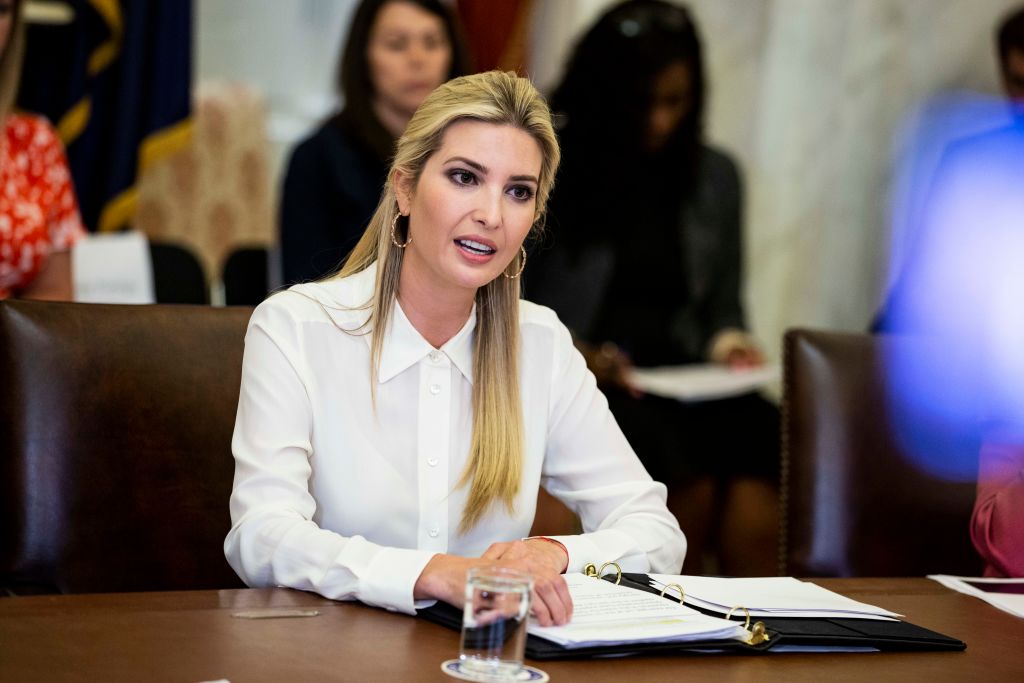
In major peace talks from 1990 to 2017, women made up just 2% of mediators, 8% of negotiators and 5% of witnesses and signatories, according to the United Nations.
Ivanka Trump wants to change that.
In a roundtable discussion with lawmakers from both parties this week, the White House senior adviser called for more women to be involved in conflict management, negotiation and resolution around the world.
Her argument? They help lead to more effective agreements.
“When women meaningfully participate in peace negotiations,” Trump added, citing a United Nations report, “the likelihood that the resulting peace will endure more than 15 years increases by 35%.”
Trump was joined by Republican Sens. Jim Risch and Shelley Moore Capito, Democratic Sens. Ben Cardin and Jeanne Shaheen and U.S. Agency for International Development Administrator Mark Green and officials from the State and Defense Departments.
Participants described the strategy as relating to both social justice for women around the world, and national security for Americans. In order to achieve improvements in those two realms, Trump announced the Administration has hired a Director of International Organizations to work on the strategy from the National Security Council. She also said new metrics would be announced in the next 90 days to track progress from various development agencies.
“In government terms, that’s basically tomorrow,” she joked.
Though the event’s attendees acknowledged it’s easier to implement and enforce gender equity solutions stateside, versus in countries that have historically enforced more stringent gender roles — like Afghanistan, where the adult female literacy rate is only 18% — many spoke optimistically of the bargaining power the United States is able to exert over these other nations on related topics.
“The United States has a great deal of influence around the world, and we can make a difference on this equation,” said Cardin. “And if we change those metrics to be much more balanced, I am very confident we’re going to have a more stable world, and U.S. national security will be protected by that.”
Going off that, USAID Administrator Green described situations in which United States officials sit down with partners from other nations to deliver them “roadmaps,” or goals they need to address to achieve “sustainable development.” Though he said people in his field anticipated some international leaders and partners could have taken offense to their suggestions, all of them have positively responded thus far. Every country has either acknowledged it has work to do, or that it feels it’s making progress on the issue, he said.
There was one contentious moment at the Tuesday event, in which Shaheen stated her frustration with Secretary of State Mike Pompeo for refusing to commit to prioritizing women’s involvement in Afghanistan peace talks in respect to the law that President Donald Trump signed in October 2017 — an issue she has previously raised.
Still, Shaheen told TIME she was optimistic about how the roundtable went and hopes the accompanying strategy will help women in Afghanistan participate in critical negotiations.
“Afghan women want peace without oppression, and the best way to ensure that they don’t lose their hard-fought rights and freedoms is for them to have a real presence at the negotiating table,” Shaheen said.
More Must-Reads from TIME
- Donald Trump Is TIME's 2024 Person of the Year
- Why We Chose Trump as Person of the Year
- Is Intermittent Fasting Good or Bad for You?
- The 100 Must-Read Books of 2024
- The 20 Best Christmas TV Episodes
- Column: If Optimism Feels Ridiculous Now, Try Hope
- The Future of Climate Action Is Trade Policy
- Merle Bombardieri Is Helping People Make the Baby Decision
Write to Abby Vesoulis at abby.vesoulis@time.com